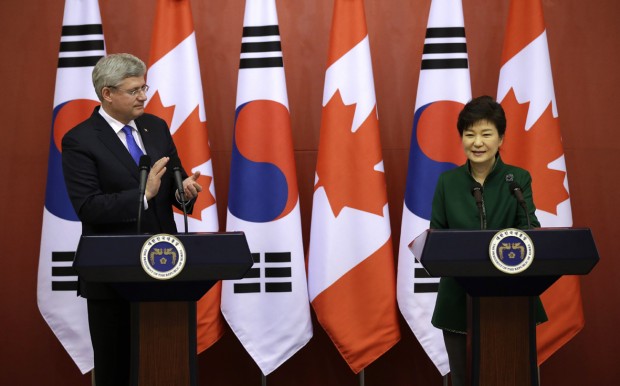South Korea and Canada to sign FTA
By Joel Lee
South Korea and Canada will sign a free trade agreement (FTA) on Tuesday, which would eliminate nearly all tariffs on the mutually agreed products for the next 10 years.
As part of a state visit address in Ottawa on Sunday, South Korean President Park Geun-hye said the agreement will elevate the two countries’ relations to a “comprehensive partnership” by strengthening free economic and trade cooperation.
Korea’s auto and electronic appliances industry and Canada’s agricultural, seafood and forestry sectors will be among the biggest winners on each side. Trade between Korea and Canada has so far been limited to natural resources and manufacturing, but the services and cultural sectors are also expected to reap the benefits.
Through the agreement, Seoul expects a 0.04 percent increase in per capita gross domestic product (GDP) over the next 10 years, amounting to a total of $500 million rise in overall welfare.
Korea’s automobile industry is expected to be the biggest beneficiary. In 2013, more than 40 percent of Korean products exported to Canada was comprised of autos, as Canada is Korea’s one of top five auto export destinations.
Other auto-related parts, including tires and electronic appliances, will also have tariffs eliminated either immediately or gradually into the ratification of the deal over the next five years.
South Korea’s agricultural industry, which is expected to suffer the most with an estimated $32 million annual loss, will have 19 percent of all its products excluded from the tariff targets or removed gradually for the next 10 years, according to Cheong Wae Dae officials. The Korean government is also planning to offer 2.1 trillion won ($2.0 billion) in subsidies.
As both G20 and OECD members, Korea and Canada rank as “equal” in the second tier of the world’s elite economies. Korea is the 12th largest economy in the world in terms of purchasing power parity and Canada is the 14th largest.
“The Korea-Canada FTA has much broader political significance,” former Canadian Ambassador to Korea Len Edwards told The Globe and Mail. “We are ready for further ‘big deals’ in Asia and the tough decisions that accompany them.”
“It tells Asians that Canada is also ready to tie its economic future to their region and provide them with another link to the European marketplace. It is a sign of commitment,” he said.
“The agreement’s indirect impact should not be overlooked, politically re-energizing interest and activity in other areas of relations and underpinning a stronger strategic partnership between two of the world’s important second-tier powers,” he added.
However, Edwards noted that the outcomes will depend on the efforts of the government and businesses that can “leverage the positive mood and momentum” that has been created.
Nine years of tough negotiations have passed since the two countries first began discussing establishing the FTA in 2005. 14 rounds of bargaining sessions were held before finalizing on the agreement. South Korea is the first Asian country to sign an FTA with Canada.
Korea originally benefited from multilateral trade cooperation such as the World Trade Organization (WTO) and General Agreement on Tariffs and Trade (GATT). However, Korean companies started losing competitiveness under the scheme as the rest of the world gave preferential terms to their FTA partners from the late 1990s. This led the Korean government to pursue bilateral trade agreements to ensure the competitiveness of Korean products.
Korea’s first FTA was signed with Chile in 2004 and has since expanded to more than 20 nations and regional bodies. FTAs with Chile, Singapore, EFTA, ASEAN, India, EU, Peru and the U.S. are currently in effect.
Korea’s FTA with the U.S. in 2006 was a turning point in the establishment of public participation channels and well-defined procedures for compensation measures.
Korea has concluded FTAs with Australia, Turkey, Canada and Colombia and is undergoing negotiations with China, Mexico, GCC, New Zealand, Vietnam, Indonesia and Japan.
























































